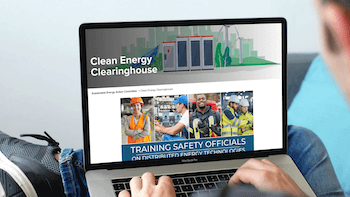Three clean energy organizations have formed a partnership to provide educational resources and training on clean energy technologies for building operators, managers and safety officials.
The Interstate Renewable Energy Council (IREC), New Buildings Institute (NBI), and Southface Institute are collaborating to provide these resources on safe and effective deployment of distributed energy resources (DER) in buildings across the country. IREC, NBI and Southface Institute have launched CleanEnergyClearinghouse.org, an interactive learning resource providing unbiased educational resources on solar photovoltaics, electric vehicle supply equipment, battery storage, grid-interactive technologies, and highly efficient building materials.
With each passing month, more clean energy resources are coming online at an exponential clip, and a highly skilled U.S. buildings workforce is needed to manage and support this growth. Federal, state and local climate and greenhouse gas reduction goals are accelerating this transition. Meeting these ambitious goals requires building operators, managers and safety officials to understand their roles in this transition.
The organizations are working in concert under the U.S. Department of Energy’s (DOE) Empowered program, which is funded by three technology offices within the Office of Energy Efficiency & Renewable Energy: Building Technologies Office (BTO), Solar Energy Technologies Office (SETO) and Vehicle Technologies Office (VTO). The partnership is an arrangement among the offices that leverages the unique skills and strengths to deliver comprehensive resources that support safe and effective distributed energy resource deployment.
“IREC is enthusiastic about this innovative collaboration under DOE leadership, which is consistent with our history of convening diverse stakeholders to tackle complex clean energy challenges,” says Larry Sherwood, IREC’s president and CEO. “Our collective action to accelerate clean energy adoption is needed to reach climate and equity goals.”
Since the launch of the clearinghouse in April 2021, more than 25,000 professionals have accessed educational resources and training courses. To develop these and forthcoming resources, hundreds of stakeholders participated in a series of forums hosted by Southface to elicit feedback on the most critical educational and training needs associated with these technologies.
“Building the infrastructure that a net zero future requires depends on a prepared and trained workforce,” comments Peter Carpenter, education project manager at Southface. “Relevant, accessible, timely educational materials and training will accelerate the adoption and implementation of renewable energy and energy efficiency in new and existing buildings, leading to the advancement of the nation’s energy security and efficiency goals.”
The three project leaders unite almost 20 clean energy organizations as additional collaborators. This effort facilitates knowledge sharing and will improve the implementation of renewable energy and energy efficiency technologies in communities across the U.S. Professionals and industry benefit from access to fact-based, industry-vetted educational resources and training that are relevant and responsive to the rapid advancement of distributed energy technologies.
“When diverse and committed organizations collaborate, the combined effort exceeds expectations, and we all move closer to a 100 percent clean energy future that is reliable, resilient, and equitable,” states Madeline Salzman, the partnership’s manager at DOE.
“Working collaboratively with such a wide network of partners and stakeholders to close training gaps and other barriers to implementing distributed energy resources is allowing us to be agile in responding to changing industry needs,” mentions Diana Burk, project manager at NBI. “By cooperatively working to develop, test, and implement education and training, we are able to not only learn from each other, but also capitalize on the breadth of experience and knowledge across technologies and markets.”
Together, the organizations have developed interactive courses and resources about emerging clean energy technologies. This year the group will produce a searchable model codes database and permitting and inspection guides and training for solar, storage and EVSE, all accessible within the clearinghouse.
Project partners include IREC, International Code Council (ICC), Slipstream, International Association of Electrical Inspectors (IAEI), National Association of State Fire Marshals (NASFM), Pacific Northwest National Laboratories (PNNL), Florida Solar Energy Center, NBI, International Code Council (ICC), Forth Mobility, Earth Advantage, Southwest Energy Efficiency Project (SWEEP), Metropolitan Area Planning Council, Southface, International Code Council (ICC), Slipstream, American Institute of Architects (AIA), Energy & Environmental Building Alliance (EEBA), Midwest Energy Efficiency Alliance (MEEA), and Southeast Energy Efficiency Alliance (SEEA).




